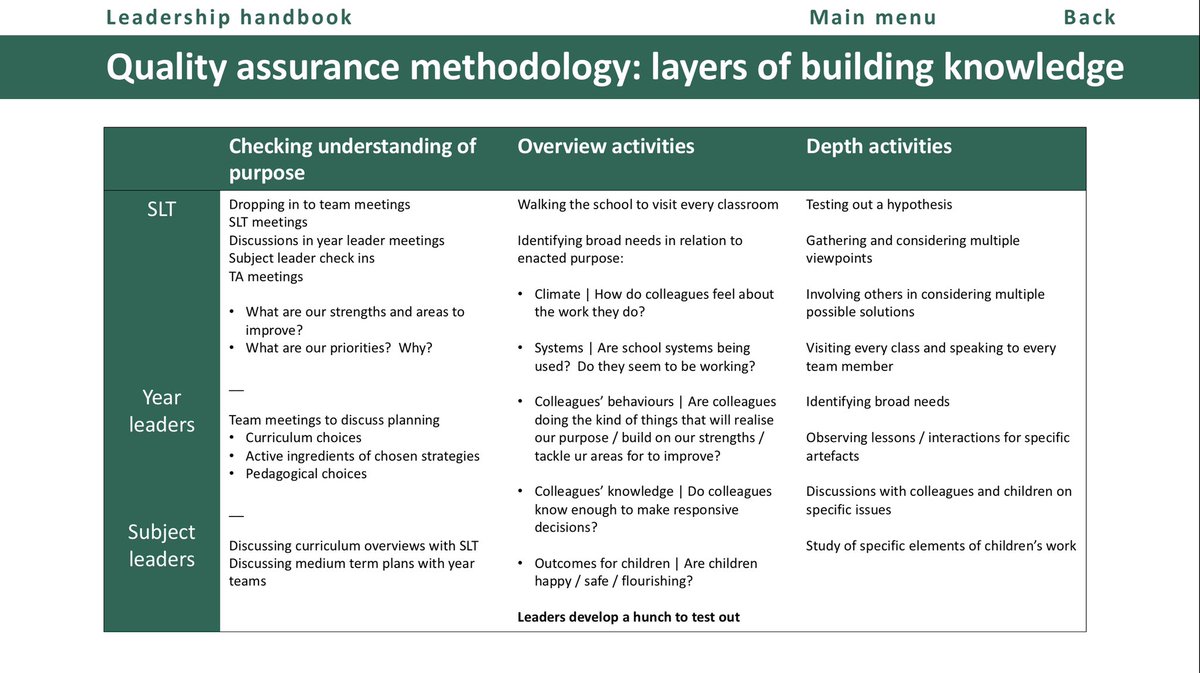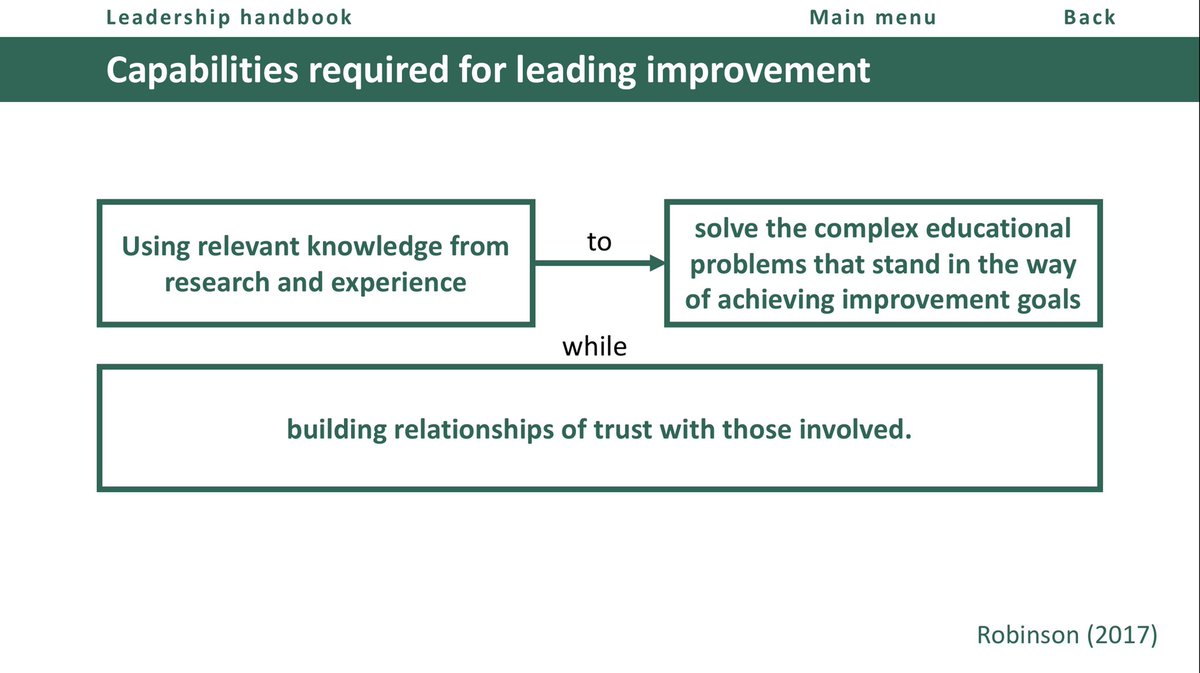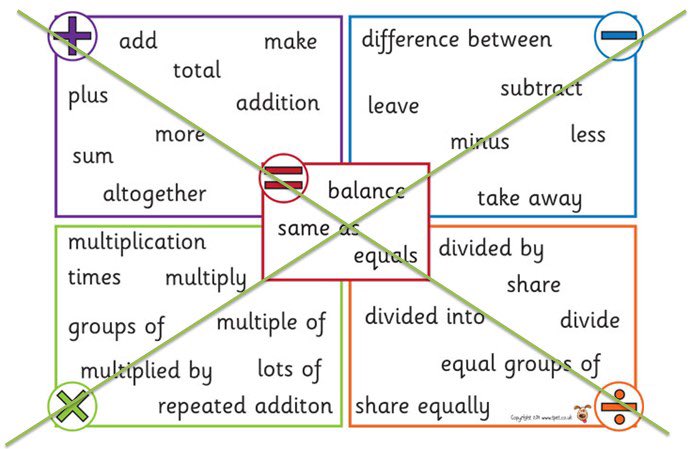
Some thoughts on quality assurance / monitoring.
It is all very well observing lessons and discussing children’s work with them but maybe there are opportunities to pick up strengths and areas for improvement sooner…
🧵
1/16
It is all very well observing lessons and discussing children’s work with them but maybe there are opportunities to pick up strengths and areas for improvement sooner…
🧵
1/16
The bottom line is that leaders need to know the extent to which children are flourishing, whether that is academically, socially, behaviourally, emotionally and much more.
If we know this, we’re better placed to think about what we might do to improve them.
2/16
If we know this, we’re better placed to think about what we might do to improve them.
2/16

Outcomes might mean all sorts to different people.
One person’s standard of behaviour, for example, can be very different to the next.
If we’re evaluating this, it makes sense to have some sort of shared idea of what it looks like.
mrnickhart.wordpress.com/2022/02/18/pur…
3/16
One person’s standard of behaviour, for example, can be very different to the next.
If we’re evaluating this, it makes sense to have some sort of shared idea of what it looks like.
mrnickhart.wordpress.com/2022/02/18/pur…
3/16
Outcomes for children are the ultimate goal and there are all sorts of influencing factors.
A simple cause and effect relationship between leaders’ / teachers’ actions and outcomes for children probably doesn’t exist.
mrnickhart.wordpress.com/2022/03/03/the…
4/16
A simple cause and effect relationship between leaders’ / teachers’ actions and outcomes for children probably doesn’t exist.
mrnickhart.wordpress.com/2022/03/03/the…
4/16
Leaders need to be careful not to attribute cause to effect with too much confidence and conviction. If we do this, we’re likely to be leaning into our biases and preferences
5/16
5/16
Not only this, but leaders cannot possibly have the full picture of all the possible contributing causes.
We cannot notice and know everything and our very presence changes people’s behaviour.
We information from a variety of sources.
6/16
We cannot notice and know everything and our very presence changes people’s behaviour.
We information from a variety of sources.
6/16
Leaders need to appreciate the complex nature of schools. For every outcome (at any point on the continuum from ‘good’ to ‘bad’), there are lots of contributing factors.
7/16
7/16
I think they can be broadly categorised as:
✅ Colleagues’ knowledge
✅ Colleagues’ behaviours
✅ Systems and processes
✅ Climate
Each influences the others in ways that we might predict and ways that we cannot.
8/16
✅ Colleagues’ knowledge
✅ Colleagues’ behaviours
✅ Systems and processes
✅ Climate
Each influences the others in ways that we might predict and ways that we cannot.
8/16
Therefore quality assurance / monitoring is fundamentally about building our knowledge of the reality of school life in these domains so that we can make sensible decisions about how we can improve each one, with the ultimate goal of improving outcomes for children.
8/16
8/16
Lesson observations, learning walks and looking at children’s work are all very well and important.
But they all come at a particular stage.
9/16
But they all come at a particular stage.
9/16
We ought to check for understanding earlier than these practices afford.
During the formative stage of introducing a new idea, leaders need to check that everyone understands what our strengths our, what problem we might be trying to solve and what our priorities are.
10/16
During the formative stage of introducing a new idea, leaders need to check that everyone understands what our strengths our, what problem we might be trying to solve and what our priorities are.
10/16
If everyone is on the same page here, we’re far more likely to enable genuine aligned actions that goes beyond just ‘doing what leaders have advocated’.
mrnickhart.wordpress.com/2022/06/14/wha…
11/16
mrnickhart.wordpress.com/2022/06/14/wha…
11/16
Supporting middle leaders’ understanding of priorities and strategies, dropping into team meetings and having plenty of conversations about ‘why’ is a necessary first layer of quality assurance.
mrnickhart.wordpress.com/2021/10/15/how…
12/16
mrnickhart.wordpress.com/2021/10/15/how…
12/16
This allows leaders to intervene with misconceptions before jumping into feeding back on practices that we see in the classroom where the stakes are higher.
13/16
13/16
Here are two models of quality assurance that I intend to think and write about a bit more over the coming weeks.
15/16

15/16


If this is interesting, you’ll enjoy #ImpactBook.
Available to pre order and out this week!
mrnickhart.wordpress.com/impactbook/
16/16
Available to pre order and out this week!
mrnickhart.wordpress.com/impactbook/
16/16
• • •
Missing some Tweet in this thread? You can try to
force a refresh














